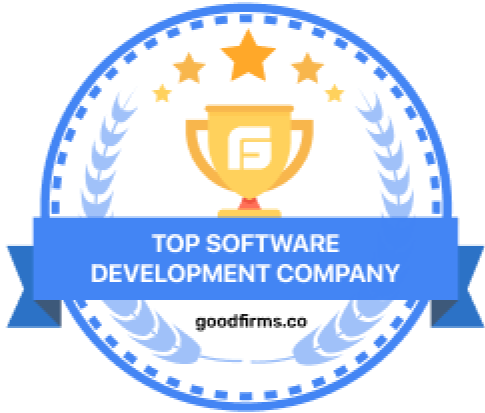Artificial intelligence (AI) and machine learning (ML) are no longer futuristic concepts in healthcare; they are rapidly transforming the industry, offering unprecedented opportunities to improve patient care, streamline operations, accelerate medical research, and enhance the overall healthcare experience. This blog post explores nine key ways AI and machine learning are revolutionizing healthcare, from diagnostics to drug discovery and beyond.
9 Ways AI and Machine Learning are Transforming Healthcare
1. Improved Diagnostic Accuracy: Early and Potent Insights
AI and ML algorithms are fantastic at ingesting vast chunks of medical data such as clinical images (X-rays, MRIs, CT scans), electronic health records, lab results, and genomic information. This facilitates them to detect ailments much earlier and with accuracy much better than a human doctor can.
Many subtle patterns remain unnoticed by human clinicians. Deep learning in healthcare is proving particularly powerful in areas like radiology, pathology, and dermatology, leading to faster diagnosis, more effective treatment, and improved patient outcomes. This is a cornerstone of medical diagnosis using machine learning.
Example:
AI technology can interpret a mammogram far more sensitively and specifically compared to a human radiologist thereby reducing false negative results and additional biopsies. The algorithm can further distinguish between benign lesions and malignant, such as in melanoma allowing for an intervention at the primary stage with great improvement in a patient’s forecast.
2. Personalized plans of treatment as per individual
AI and machine learning algorithms can analyze a patient’s unique genetic information, comprehensive medical history, lifestyle factors, and even environmental exposures to create personalized treatment plans.
This personalized medicine approach takes into account individual variations in response to treatments, allowing clinicians to choose the most effective therapies with the fewest side effects. This targeted approach is revolutionizing the management of diseases, moving away from a one-size-fits-all model to a more precise and individualized approach, a key aspect of machine learning in healthcare.
Example:
AI algorithms can predict a patient’s response to different chemotherapy regimens based on their tumor’s genetic profile, allowing oncologists to choose the most effective treatment with the fewest side effects, minimizing patient suffering and improving quality of life.
3. Accelerated Drug Discovery and Development: From Lab Bench to Market Faster
AI and machine learning are dramatically speeding up the drug discovery and development process by sifting through large amounts of biological data, chemical compounds, and clinical trial data to find promising leads with their efficacy and safety profile. This can cut significantly the time it takes and the cost involved in bringing new drugs to the market, thus hastening access to life-saving therapies.
Example:
Analysis of molecular structure by AI empowered platforms and evaluation of their suitability as drug candidate for a targeted disease will definitely make the overall process of the drug discovery seamless and help detect potential targets and research further, or analysis and interpretation of trial data for which patients are in need of those drugs to derive maximum benefits is another aspect towards the efficient trial.
4. Operational Efficiency Simplification and Resources Optimization
AI and machine learning can automate administrative tasks, streamline workflows, and optimize resource allocation in healthcare settings, increasing efficiency, lowering costs, and improving patient care.
These include automating appointment scheduling, managing patient records, processing insurance claims, and even predicting hospital readmissions. This is where CRM and healthcare intersect. A good healthcare CRM will leverage AI to improve patient engagement, personalize communication, and streamline administrative tasks.
Example:
For instance, it can answer some questions of a patient, schedules appointments, suggests basic medical remedies, and route patients to adequate resources. Its human staff gets time to look into more important and strategic problems.
A powerful hospital CRM has the potential for using customer relationship management in health care industry best practices to uplift patient satisfaction as well as patient loyalty. May it be doctors’ CRM or healthcare industry’s CRM, artificial intelligence can fortify their power. This might be a healthcare industry CRM software or a CRM software for healthcare industry, especially for a specific hospital or clinic.
5. Increased Patient Engagement
AI-powered platforms can engage patients through offering personalized health information, reminders, and support. More importantly, chatbots answer patient questions and provide educational resources while sometimes also offering emotional support. This puts the patient in a more active position in their care, ultimately allowing better health outcomes. This is closely tied to patient engagement solutions.
Example:
A mobile app utilizes AI to recommend specific instances of medication refill reminders, scheduling of medical appointments, and lifestyle choices for health. Through the app, patients can be linked with online support groups and educational materials.
6. Remote Patient Monitoring and Telemedicine
These also enable the increase in telemedicine services and patient monitoring remotely: this has given access to people, especially the rural areas patients, the one with mobility or chronic conditions and needs continuous checking.
Artificial intelligence-based programs can connect remote patients with doctors, monitor various vital signs and analyze health records, which further provides personal attention to care delivery, hence widening access to health care and allowing fewer visits into hospitals. These must, therefore, be HIPAA compliant and adhere to the standards set by HIPAA, especially if they are to use AWS HIPAA compliant services for data storage and processing.
Example:
A patient with a chronic heart condition can use a wearable device connected to an AI-powered platform to monitor their vital signs and alert their doctor to any potential problems, allowing for early intervention and preventing serious health events.
This is a critical component of the growing field of e telemedicine and is an important aspect of any comprehensive telemedicine in healthcare strategy. It may be a telemed service or a telemedicine in health care solution.
Again, any telemedicine website or sites must uphold HIPAA and HIPAA HITECH regulations, especially on the issue of PHI HIPAA and the security rule in HIPAA. This is particularly the case when there is integration into systems such as electronic health record integration. Concerns such as HIPAA in cybersecurity are also essential.
This is a vendor with whom one must work when dealing with an AWS compliance HIPAA and where it can guarantee solutions that would be HIPAA certified and therefore adhere to the HIPAA HIPPA regulations. This is quite relevant for any organization offering telehealthcare or telemedication services. The same applies to patient engagement solutions.
7. Predictive Analytics
AI and machine learning can use patient data to predict future health risks, anticipate patient needs, and prevent costly readmissions into hospitals. Healthcare providers can then intervene before such a patient is readmitted in order to make all the necessary support interventions which would avoid any readmission, improve patient outcomes while saving healthcare costs.
Example:
AI algorithms can analyze patient data, including demographics, medical history, and social determinants of health, to predict the likelihood of hospital readmission and identify patients who would benefit from targeted interventions, such as home health visits or medication management programs.
8. Drug Repurposing: Finding New Uses for Existing Medications
AI and machine learning can expedite the drug repurposing process by screening scientific literature, clinical trial data, and genomic information to discover novel applications of marketed drugs. That can unlock a new therapeutic horizon for diseases whose treatments have either failed or cannot be effectively delivered.
Example:
AI algorithms can analyze the molecular structures of existing drugs and compare them to the molecular targets of different diseases to identify potential repurposing opportunities.
9. Modernizing Legacy Systems: Laying the Foundation for AI Integration
Many healthcare organizations rely on outdated legacy systems that can hinder the adoption and integration of AI and machine learning technologies. Legacy application modernization, legacy software modernization, and legacy system modernization services are important for preparing these systems for the future of healthcare.
This includes legacy modernization services, legacy software modernization services, and legacy app modernization. Modernizing these systems allows for seamless data integration, improved data quality, and enhanced security, laying the groundwork for the successful implementation of AI and ML solutions. This is a significant component of legacy system modernization services. The use of national telemedicine service platforms also underlines the increasing role of technology in healthcare.
Conclusion:
AI and machine learning are poised to revolutionize every aspect of healthcare, from enhancing diagnostics and personalizing treatment to accelerating drug discovery and improving operational efficiency. These technologies hold the promise of transforming healthcare from a reactive, one-size-fits-all model to a proactive, personalized, and data-driven system.
While challenges remain, including data privacy, regulatory hurdles, and the need for skilled professionals, the promise of AI and machine learning in healthcare is immense. By embracing the transformative technologies with responsibility and morality, we could unlock a whole new era in healthcare that can be more accessible, affordable, and effective to all.
We are already beginning our journey into a future that will see the integration of AI and ML to healthcare delivery as a reality for improvement in the health and wellness of humans.

Start a Project with Ajackus

































